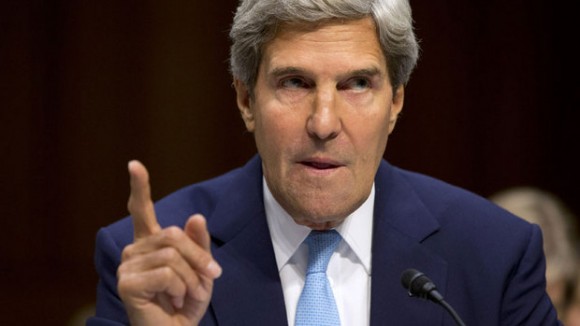In response to the revolution in Ukraine, Moscow has ordered a 150,000-troop Russian military exercise in the semi-autonomous region of Crimea, right on Ukraine’s border. Amid the commotion, pro and anti- Russian residents residents of Crimea have protested.
Dmitri Trenin and Andrew S. Weiss at the Carnegie Endowment for International Peace give a brief primer on the Crimea situation:
Crimea is a very special—and delicate—case. It is Ukraine’s only autonomous republic, though its autonomy was sharply curtailed in the mid-1990s. Its population of nearly 2 million is about 60 percent Russian, many of whom are retired Russian military personnel. Russia’s naval base in Sevastopol is home to some 15,000 active-duty servicemen, and much of the city essentially lives off of the base. About 12 percent of Crimeans are Tatars, who are generally loyal to Kyiv due to their tragic history. (They were persecuted and repatriated by Stalin for alleged disloyalty at the end of World War II and were only able to return to Crimea at the very end of the Soviet period.) Throughout independent Ukraine’s twenty-plus-year history, Crimea’s residents, only 24 percent of whom are ethnic Ukrainians, have seen themselves as a breed apart from the Ukrainian mainstream.
They explain that Russia’s military exercise could be a dangerous move:
It would be a surprise if Russia moved to annex the region outright. Although Putin has maintained his silence on the situation in Ukraine since this past weekend, events on the ground are challenging Ukraine’s territorial integrity and raising the possibility that Russian troops will become directly involved in pulling the country apart.
Putin’s hand could be forced (and conflict could come to the region inadvertently) depending on how the new authorities in Kyiv respond to recent moves by the local population. One can easily imagine a harsh Russian response if Kyiv takes rash steps to reassert its authority in Crimea either by sending in troops or by allowing revolutionary paramilitaries to launch a “people’s march” on Crimea.
Today, Secretary of Defense Chuck Hagel warned Russia not to intervene, failing to mention that (1) Washington has been intervening in Ukraine from the start, and (2) it’s really none of our business what Russia does.
“We expect other nations to respect Ukraine’s sovereignty and avoid provocative action,” Mr. Hagel said. “That’s why I’m closely watching Russia’s military exercises along the Ukrainian border…”
In any case, telling Russia to behave itself has about zero chance of helping the situation. “Russian leaders believe, rightly or wrongly, that the West drove events in Ukraine to the brink of collapse to secure geopolitical advantage over Moscow,” Trenin and Weiss say. “Thus, Western appeals for Russian restraint in the event of a crisis over Crimea are unlikely to resonate.”
But the eagerness in Washington to steer events in Ukraine and beat out Russia in some pointless geopolitical game has not yielded. In this Daily Beast report, Republican leaders Buck McKeon and James Inhofe berate Obama for being too soft on Russia; they both express a deep longing for the Cold War era when it was easier to justify any reckless military action abroad on the grounds of opposing Soviet designs.
David Rhodes, a Reuters columnist, quoted former Romney adviser Nile Gardiner as reiterating Romney’s 2012 line that Russia is America’s greatest geo-political foe and arguing that “an ‘ideological war’ was underway and Putin is winning.”
Gardiner then worries that Washington’s inability to force Russia to lay prostrate at the feet of American power is encouraging other countries to defy their American master: “Putin is viewed by American adversaries and competitors as someone who has stood up to American influence and gotten away with outflanking the United States. Adversaries take note of this and they sense weakness and that’s dangerous. Dissidents also take note.”
Obama’s State Department, which as we know has quietly tried to pull off regime change in Ukraine (only to be outed by a leaked phone conversation), prefers to apply the Republican bellicosity, just to do it quietly:
“What we’re trying to do is work through diplomatic channels with the Russians,” a senior State Department official told Rhodes. “That doesn’t mean going public with some tough rhetoric that might please some domestic constituencies. This is not an era where tough talk gets the job done.”
Tough talk is so 1980. Secrecy is now the American way.




